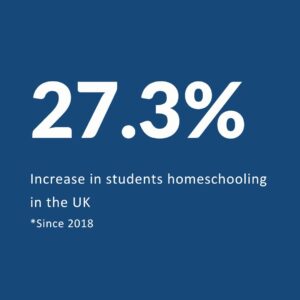 27% rise in students homeschooling
27% rise in students homeschooling
Following consultation with more than 100 United Kingdom councils, calculations indicate a rise in students homeschooling of 27.3%* on a national level since 2018. These recent figures, obtained through Freedom of Information (FOI) requests, show that despite Covid-19 restrictions easing up, and schools re-opening, many parents have opted to continue homeschooling their children.
Wolsey Hall Oxford Principal, Lee Wilcock, comments: “What seems very apparent is that those parents who chose to try homeschooling for the first time during Covid-19 have realised how beneficial online learning can be. Homeschooling allows children to learn at their own pace and at a time which suits them. It is a much more child-centred approach to education than is available in a traditional classroom.”
2022 statistics show that there are now more than 71, 515 homeschoolers in the United Kingdom – up from 59, 559 in 2018 and 22, 408 in 2013.

Of course, the pandemic is not the only reason for the rise in students homeschooling. At Wolsey Hall we’ve found that some of the most common reasons for parents to choose homeschooling include:
- Lack of progress or underachievement at mainstream schools;
- Frustration with teaching standards in mainstream schools;
- Concerns for their child’s safety/bullying;
- Behavioural issues that are not suitably dealt with in mainstream schooling;
- Medical reasons/disabilities that inhibit a child’s ability to learn in a conventional environment;
- Travelling and expat families;
- Gifted/higher learning potential students or those who are elite athletes/in the performing arts.
It is also interesting to note that a well-being survey conducted by Wolsey Hall Oxford in August 2022 – and completed by 343 parents – concluded that 91.5% of parents believe that their child’s well-being has improved since they opted to homeschool.
One parent noted, “My son has thrived. He is a true (gregarious) introvert… He loves being around people socially, but it tires him out, so school left him feeling drained, with no energy for true social interactions. Being able to learn alone and quietly has left him with plenty of energy for social and extra-curricular activities – scouts/young leaders, tennis, drama club, youth group etc. He has become confident in his own abilities and also learnt when and how he can take the initiative to get help when needed.”
Another parent said, “Not having to navigate an overwhelming environment where [my son] can see that his extra needs nor his exceptional talents are supported is a huge relief. It took a long time for the school-associated anger and trauma to dissipate so he could enjoy learning without triggers. He still finds it hard to overcome his learning difficulties but can cope with his day now. This leaves him able to enjoy his evenings and engage in social connections.” Another parent commented that “Homeschooling has [had] a positive impact. My daughter is getting more time to study as well as participate in her various hobbies. It also helps her to study things in a practical way. Homeschooling gives her more time to experiment with her ideas, helps her to do things in her way and [to] learn from her mistakes.”
With learners in more than 120 countries, Wolsey Hall Oxford’s wide network has enabled many students to learn their way and to excel since 1894, which is why it is renowned as the most experienced homeschooling college in the world.
To find out more about these statistics, interview any of our team members or to learn more about Wolsey Hall’s approach to homeschooling, please contact Karen Binedell on karen.binedell@wolseyhalloxford.org.uk
